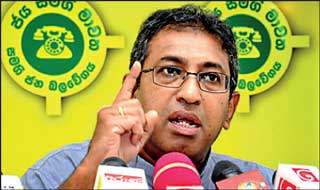Wednesday Feb 18, 2026
Wednesday Feb 18, 2026
Monday, 5 September 2022 00:23 - - {{hitsCtrl.values.hits}}
 |
| SJB Parliamentarian Dr. Harsha de Silva - Pic by Lasantha Kumara
|
SJB MP Dr. Harsha De Silva said he nearly fell off his chair when he heard the Government had reportedly agreed with the IMF to reach a primary account surplus of 2.3% of GDP by 2025.
De Silva noted that Sri Lanka had only registered a positive surplus once in recent times; during the tenure of the late Mangala Samaraweera, when he was Finance Minister.
The Opposition MP who is also Chairman of the Parliamentary Committee on Finance, said the primary account had dropped to around (6%) of GDP during the tenure of President Gotabaya Rajapaksa, and questioned how the Government plans to achieve this figure. “How can we deliver such a transformation in such a short period of time?”
De Silva noted that neither Parliament nor the finance committee has yet been informed on the details of the IMF agreement, and stated it would be a monumental feat to bring the primary account to a surplus of 2.3% of GDP. He noted that Government would need to drastically enhance revenue and slash spending exponentially.
However, the amount of expenditure that can be trimmed further at this juncture is limited, De Silva noted, given that public expenditure is already at a minimum. Capital expenditure in critical sectors such as health and education would have to be brought to a complete standstill he noted. Despite VAT going up to 15% this month and the upcoming Social Security Levy, these would be inadequate to boost Government revenue to such levels, he said.
“Government groups appear rather pleased that they have arrived at a Staff-Level Agreement with the IMF. These are the same groups that until recently spoke down of the IMF and any requirement for Sri Lanka to engage with them. If the then Government had engaged with the IMF when we first made overtures of the requirement in 2020, Sri Lanka need not have faced such intense difficulties.
“The public are still unaware of the gamut of requirements the agreement may entail. The need to restructure our debt places additional burden on the Government. We will have no choice but to tell creditors that we cannot meet any interest payments for at least four to five years.”
De Silva added there were reports the president said the domestic debt too would have to be restructured. This entails debt provided by local banks and the EPF fund, and he said any attempts to restructure this segment of debt would result in chaos. He added the recent economic proposals forwarded by the SJB had avoided any measures to restructure domestic debt.
The Opposition MP also stressed the need to activate a social security system to safeguard most vulnerable groups to safeguard them against the rapidly escalating cost of living. He added that the middle-class was gravely impacted by food inflation, and asked what program or proposals the Government envisages to provide a lifeline to these people.